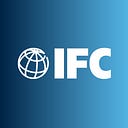By Alzbeta Klein
Earlier this month, the Intergovernmental Panel on Climate Change (IPCC) issued a landmark report with a chilling bottom line: the world has a decade or so to stabilize global warming.
Global leaders have been put on notice. The time to change is now. Solving this problem will be harder than anything the world has ever faced before, requiring the global economy to work at a speed and scale that has no documented historic precedent.
And yet, despite this latest news, I remain optimistic. Why? While world leaders work toward ways to implement the Paris Agreement, the global transition to a low-carbon economy is already taking place, with the private sector and the International Finance Corporation (IFC) leading the way. A recent analysis by IFC shows that nearly $23 trillion in climate investment opportunities between now and 2030 are located in 21 emerging-market economies.
This global business momentum towards climate action was showcased earlier this month in Vienna, when over 240 climate business leaders and innovators gathered beneath the imperial splendor of the city’s Hofburg Palace complex to share climate business ideas of tomorrow at IFC’s Fifth Annual Climate Forum.
Capitalizing on a series of recent high-level climate action events — San Francisco’s Global Climate Action Summit, the One Planet Summit in New York, and the release of the IPCC report — there was a renewed sense of urgency and commitment amongst the Forum’s participants who included members of the renewable energy, agribusiness, transport, and manufacturing sectors, green building developers, global financial institutions, government and city representatives, and entrepreneurs who are on the cutting edge of climate-smart technologies.
Bound by a shared commitment to environmental sustainability, these businesses and investors know that there is a clear alignment between doing good for the planet and doing good business. Transitioning to a low-carbon economy has already created a $1 trillion annual global market in renewable energy, climate-smart agriculture, green buildings, carbon-efficient transportation, and other infrastructure. The business leaders that I met in Vienna understood that climate business is not only a positive humanitarian move — it’s also a highly lucrative one.
In Vienna, we heard from companies that there is opportunity and business in the climate space. Our role is to get businesses to recognize this and find scalable and replicable solutions.
Many forward-thinking financial institutions are already taking advantage of this value proposition. Take Kyrylo Shevchenko, Chairman of Ukraine’s Ukrgasbank, who in 2016 made the daring move to convert Ukrgasbank into Ukraine’s first ever ‘green bank’, with specialized green banking services across its retail, SME and corporate segments. “We needed to change the stereotype, and to prove that the green market in Ukraine is an opportunity, and not a gimmick,” Shevchenko told me.
Just two years later, Shevchenko’s vision has paid off. Despite multiple losses in the years before Ukrgasbank’s green transformation, the bank is now profitable, with projected profits of $20 million for this current fiscal year alone. “Our green banking business has been a game changer,” Shevchenko said. “Now Ukrgasbank has become a trusted bank for investors interested in participating in Ukraine’s green sector.”
With an estimated $90 trillion of infrastructure investment required by 2030 to limit global warming to 2 degrees, there is a huge advantage for banks and financial intermediaries to accrue new business across multiple functions while also helping to save the planet.
Representatives from major financial institutions told me that while sustainable business offers unprecedented opportunities for the world’s biggest banks to help clients transition towards tomorrow’s economy, it also adds a moral dimension to their markets. “Sustainability is not just a risk reward issue. It is a moral issue,” said Roland Mees, Director of Sustainable Financing at ING Bank who spoke at the Climate Forum. “The banking sector must do good and live up to our obligations to protect the rights of future generations.”
In Vienna too, I found inspiration from innovative companies like Nestlé Nespresso who are using a shared value approach to tackle climate change and improve their own supply chains, while also decreasing the company’s carbon footprint and helping small farmers. By planting trees within and around coffee fields, Nespresso seeks to strengthen coffee farm resilience to climate change and to help reverse the degradation of natural ecosystems. This makes smart business sense — the trees cost just a few Euros each, and take only a few minutes to plant, but lead to vastly improved coffee yields. “We believe that agroforesty is an important business opportunity,” Manu Jindal, a Sustainability Project manager with Nestlé Nespresso said.
Climate change is also creating opportunities for governments that are willing to innovate. Once seen as an environmental policy issue, the growing prominence and economic impact of climate change is causing many finance ministries to take climate policy more seriously. Some governments, like Canada, have already put in place stable, long-term regulatory regimes to guide companies through the transition to a low-carbon economy.
I left Vienna convinced that climate means business, that climate action has moved to the forefront of the private sector agenda, and that governments and companies must work together. If we can continue to catalyze business leadership to drive policy ambition and help create business models of tomorrow, we can make the transition to a low-carbon economy, especially in emerging markets.
The IPCC report has given us urgency to act. And the many business leaders and entrepreneurs that I met at the IFC Climate Forum in Vienna are perfect for the job. I know that if the global private sector excels in one thing, it’s taking on the impossible.
Alzbeta Klein is the Director and Global Head of IFC’s Climate Business
